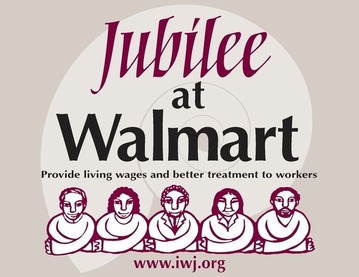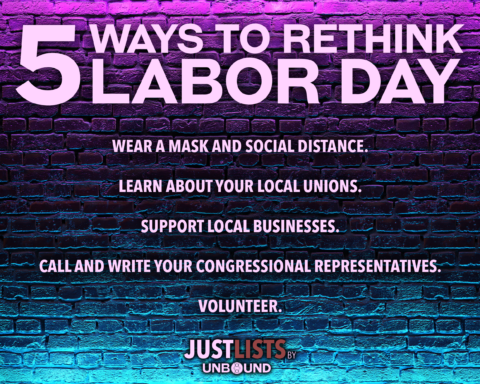 This November 23rd, at precisely 12:01 AM, millions of Americans will surge into their local Wal-Mart. They will go eagerly searching for the rock bottom prices Wal-Mart stakes its reputation on. But this focus on low prices comes at a cost—a cost felt in the daily lives of the workers directly and indirectly employed by Wal-Mart. In response, Wal-Mart workers in recent months courageously went on strike over wages and safety concerns. This Black Friday, Interfaith Worker Justice asks people of faith to stand in support of the workers of Wal-Mart, by organizing or joining prayer vigils at their local Wal-Mart. Doing so will be an act of faith in concert with the sacred texts of many religious traditions, Christianity among them.[1] For many of you this may be your first prayer vigil. So we would like to take a few minutes to comment on the working conditions of Wal-Mart workers, the effects of these conditions, what the workers are doing to change these circumstances, and what you can do to support them.
This November 23rd, at precisely 12:01 AM, millions of Americans will surge into their local Wal-Mart. They will go eagerly searching for the rock bottom prices Wal-Mart stakes its reputation on. But this focus on low prices comes at a cost—a cost felt in the daily lives of the workers directly and indirectly employed by Wal-Mart. In response, Wal-Mart workers in recent months courageously went on strike over wages and safety concerns. This Black Friday, Interfaith Worker Justice asks people of faith to stand in support of the workers of Wal-Mart, by organizing or joining prayer vigils at their local Wal-Mart. Doing so will be an act of faith in concert with the sacred texts of many religious traditions, Christianity among them.[1] For many of you this may be your first prayer vigil. So we would like to take a few minutes to comment on the working conditions of Wal-Mart workers, the effects of these conditions, what the workers are doing to change these circumstances, and what you can do to support them.

THE WORKERS
The largest private employer in the United States, Wal-Mart employs 1.4 million Americans. It is uniquely positioned to be on the vanguard of fair wages and just labor practices, yet the risks involved in taking full advantage of this opportunity have proven an effective deterrent to change. You have heard Wal-Mart’s claim that the average employee wage is $11.70. However, the independent marketing company IBISWorld puts the starting wage at $8.81,[2] a figure corroborated by actual Wal-Mart employees. As you can see in this video, when confronted, Wal-Mart is less than forthcoming.[3]
To make matters worse Wal-Mart keeps a tight restriction on hours, forcing many employees into part-time status.[4] This makes it difficult, if not impossible, for its employees to find other work to supplement their income. It also deprives those who work fewer than 24 hours a week of health benefits. So it comes as no surprise that a report found that, in California, Wal-Mart employees utilize 40% more taxpayer funded healthcare than other large retail employees.[5] Wal-Mart saved millions, you the taxpayer made up the difference.
Of those lucky enough to get fulltime work, Wal-Mart has a track record of denying overtime by illegally “shaving hours” off employee’s timesheets. In fact in 2008, the company was busted on wage and hour violations totaling over ½ billion dollars—the largest wage violation settlement in history.[6] We leave it to you to decide if workers will be fully compensated for those extra hours put into Black Friday’s midnight opening.
The combination of low pay and poor benefits creates a perfect storm of financial chaos for underpaid workers. The families of Wal-Mart employees use an estimated 38% more in public assistance programs (food stamps, subsidized school lunches, subsidized housing, earned income tax credit) than the average families of other large retail employers.[7] But Wal-Mart’s abuse extends beyond the workers in the store.
The rows and rows of merchandise in Wal-Mart’s massive stores get from loading dock to warehouse to store shelf by a complex chain of economic relationships that insulate the company from responsibility for the toll exacted upon the workers who handle these goods. Maintaining Wal-Mart’s enormous logistics system involves poorly paid, extremely dangerous warehouse work. There is a veritable army of warehouse workers engaged in delivering the items shoppers will see on Wal-Mart shelves this Black Friday. Wal-Mart is notorious for its role in outsourcing manufacturing jobs to China,[8] but with warehouse workers Wal-Mart engages in what some have called ‘domestic outsourcing’. Wal-Mart outsources these jobs to other companies in order to export the blame while demanding even more ruthless cost cutting measures at the expense of the workers. In Wal-Mart’s many logistic hubs around the U.S., workers experience unpaid wages, health and safety violations, and other labor violations.[9] Whenever a scandal breaks, Wal-Mart just fires the “one bad apple” company and continues business as usual.
THE CAUSE
But why does the 3rd largest employer in the planet (behind only the Department of Defense and the People’s Liberation Army of China) “need” to do this? Wal-Mart is already the largest supplier of groceries in America, capturing one out of every four U.S. dollars spent on groceries;[10] its CEO makes, in one hour, what the average employee makes in a year;[11] and each week nearly one-third of the U.S. population walks its aisles.[12] Wal-Mart supporters claim that low pay is the only way to keep prices low for the consumer and the only way for Wal-Mart to stay competitive and profitable. This does not withstand scrutiny.
Wal-Mart claims to save households an average of $2,300 per year (a more accurate analysis puts it at $920[13]), yet a report out of UC Berkley shows that raising the minimum wage of their hourly employees to $12 an hour would only raise the yearly shopping bill of consumers by about $12 ($.42 a trip)[14]. Wouldn’t you be willing this Black Friday to pay an extra $.42 so those who stock the shelves and check out your purchases can make a decent wage? Regarding competitiveness, the Economic Policy Institute has shown Wal-Mart could raise wages for non-managers by 17% and still remain competitive with Costco, their major big box competitor. [15]
Only one answer truly explains this consistent disregard for the worker and community. Wal-Mart holds to a ruthless cost cutting motto, where saving a buck trumps all other social and civic responsibilities. What does your faith say to you about this?

THE FIGHT
Despite the risks and challenges, workers are fighting back. Groups such as Organization United for Respect at Wal-Mart (OURWalmart), Warehouse Workers United, and Warehouse Workers for Justice have formed in the last few years to give voice to the workers of Wal-Mart. OURWalmart is a group of Wal-Mart workers supported by the UFCW (United Food and Commercial Workers International Union) who have come together to fight for fairer pay, benefits, and scheduling. These are the brave men and women you read about recently who went on strike in Illinois and California. Far from being isolated blips, these strikes quickly spread to twelve other states.[16] The risks these men and women took cannot be understated. They went on strike without the protection of a union contract and with the knowledge of Wal-Mart’s history of retaliatory action against workers who stand up for their rights (watch this video to hear one such story).[17]
Much like OURWalmart, the Warehouse Workers for Justice (supported by the United Electrical Workers) and Warehouse Workers United (supported by Change to Win) are groups that educate warehouse workers of their rights, bring together workers to defend these rights on the job, and advocate for changes to improve the lives of warehouse workers. They helped workers at Wal-Mart warehouses in Elwood, IL, and the Inland Empire area of California to successfully strike against illegal retaliation against workers who spoke out about labor violations (and they won!).[18]
HOW YOU CAN HELP: EXERCISE YOUR FAITH
As you may have read, OURWalmart issued a warning to Wal-Mart that their intimidation tactics, poor pay, and worker mistreatment must change or they “will make sure that Black Friday is memorable for them.”[19] Interfaith Worker Justice is calling on clergy and people of faith to make a stand: to publicly demonstrate their desire for Wal-Mart to do what is best for the company, its workers, and the surrounding community via prayer vigils at their local store. It is not known which Wal-Marts will be affected by the threatened walk offs, but the issues outlined above affect all Wal-Mart workers.
You are not being asked to attack Wal-Mart (leave the pitchfork and torches at home!). We are simply inviting you to ask an extremely profitable company to ensure their workers are paid a living wage and have decent benefits. It is not a boycott. You are not being asked to block shoppers or shout at management. Instead, you are, through your prayers, educating Wal-Mart and Black Friday shoppers of the human cost of these low prices. You are telling them that, for a mere $.42 more, they could purchase that heavily discounted TV from a well-paid employee instead of a poverty wage part-time worker. You are asking Wal-Mart to expand its vision beyond its myopic cost cutting focus and out to the wider community where its employees and shoppers live. In addition, your presence will act as a beacon of support to the employees who may be walking off in protest, considering walking off, or just unhappy with how they are treated.
To learn more and get involved visit the IWJ website to see if a prayer vigil is already started in your area.[20] If not, start one. “But I’ve never done one before!!” Don’t worry. Interfaith Worker Justice has produced a guide specifically for hosting a Black Friday prayer vigil at Wal-Mart. You can download it by visiting the IWJ website.
Yes. Wal-Mart is a giant. It is disconcerting to face a giant. But Goliath was also a giant. In the past, Wal-Mart has bent to concerted community pressure. Earlier this year, civil rights organizations got Wal-Mart to divest in the far right think tank ALEC. In other countries, Wal-Mart routinely negotiates with worker organizations and unions over wages and benefits. You can even watch this video to see the U.S. President voicing the same demands as OURWalmart.[21] But more importantly, as people of faith it is the right thing to do. This Black Friday Interfaith Worker Justice will be at Wal-Mart not for the deals, but for justice. We hope you will adopt a Wal-Mart in your neighborhood, praying and standing for justice.
Take action for Jubilee at Walmart! Join or organize a prayer vigil or flash mob. Or, call or write your local Walmart.
Notes
[1] http://www.iwj.org/resources/what-faith-groups-say-about-worker-justice
[2] http://old.gothamgazette.com/article/searchlight/20110214/203/3463
[3] http://www.youtube.com/watch?v=jxNibCcfsXU
[4] http://faculty.coloradomtn.edu/jtroeger/business/assignments/week_08/readings/NYT-Wal-Mart%20to%20Add%20Wage%20Caps%20and%20Part-Timers.pdf
[5] http://laborcenter.berkeley.edu/retail/walmart.pdf
[6] http://www.huffingtonpost.com/2008/12/24/walmart-agrees-to-pay-wor_n_153287.html
[7] http://laborcenter.berkeley.edu/retail/walmart.pdf
[8] http://www.fastcompany.com/47593/wal-mart-you-dont-know
[9] http://www.huffingtonpost.com/2012/10/19/walmart-warehouse-workers_n_1989121.html
[10] http://www.otherwords.org/articles/50_years_of_gutting_americas_middle_class
[11] http://www.guernicamag.com/daily/sarah_jaffe_ceo_of_walmart_mak/
[12] http://www.businessinsider.com/16-walmart-facts?op=1
[13] http://www.dollarsandsense.org/archives/2011/0211harrison.html
[14]http://laborcenter.berkeley.edu/retail/bigbox_livingwage_policies11.pdf
[15] http://www.epi.org/publication/ib223/
[16] http://www.rawstory.com/rs/2012/10/10/walmart-worker-strikes-go-viral-hitting-28-stores-in-12-states/
[17] http://www.youtube.com/watch?v=LhCtDI2pOLs&t=2m29s
[18] http://progressillinois.com/quick-hits/content/2012/10/09/chicago-area-walmart-supply-workers-end-strike-win-back-pay; http://www.warehouseworkersunited.org/striking-warehouse-workers-return-to-work/
[19] http://www.salon.com/2012/10/10/walmart_strikers_raise_the_stakes_with_black_friday_ultimatum/
[20] http://www.iwj.org/take-action/jubilee-take-action
[21] http://www.youtube.com/watch?v=DnoqshSANd8&feature=related
The Rev. Michael Livingston is Director of Public Policy at Interfaith Worker Justice. Previously he worked as the Director of the Poverty Initiative of the National Council of Churches and as the Executive Director of the International Council of Community Churches. The Rev. Livingston is a graduate of the University of California at Los Angeles and received his Master of Divinity and Master of Theology degrees from Princeton Theological Seminary.







Unbound Social